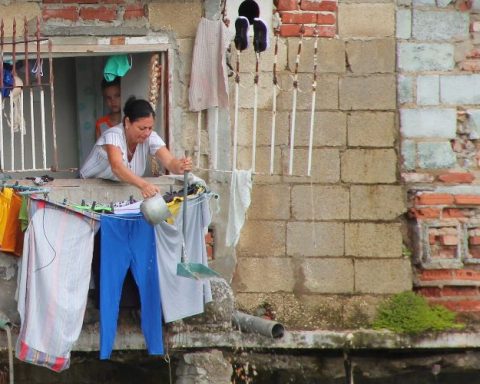HARRISONBURG, United States. — Last Monday, September 5, the digital portal Cubadebate published the first chapter of an audiovisual series produced by that site, in which the causes, nuances and effects of the migratory phenomenon in Cuba according to Castroism are analyzed.
Some of the directors of the material are representative of that young Cuban intelligentsia linked to the most stale and cynical defense of the dictatorship. Such are the cases of Edilberto Carmona Tamayo, head of the Multimedia Production and Innovation Department of Cubadebate and the Round table (what a redundancy!) and Ana Álvarez Guerrero, one of the presenters of the program edged.
Although the series has been described as “new”, it reiterates a topic that we all know: that irregular Cuban emigration to the United States from 1959 is the responsibility of the successive administrations of that country.
In this first chapter, Dr. José Ramón Cabañas, a diplomat with more than 37 years of experience and current Director of the International Policy Research Center, was interviewed.
According to the diplomat, the migratory issue is used as a tool to pressure Cuba and receives a distorted treatment to create a crisis in the country and perhaps, he assured, to favor human traffickers. Cabañas points out that this is what explains the lack of US political will to return to the political context created after the resumption of diplomatic relations during the final phase of Barack Obama’s mandate.
The official also points out that in the 1960s many of the Cubans who emigrated were members of the upper bourgeoisie or had ties to the Batista dictatorship, but that has changed and today emigration occurs for economic and political reasons.
Although at least he had the decency to acknowledge that Cubans also emigrate for political reasons, Cabañas downplayed this by stating that, once settled in their destination, these Cubans do not get mixed up in plans of political aggression or militate in parties or they join political platforms opposed to Cuba —read the regime—, but they try to establish themselves. He argued that the majority maintain their family ties and return to visit, so it is very difficult to sustain the thesis that these people are politically persecuted.
This aspect of the analysis made by the expert seems to me to be one of the most controversial and sends another signal about the need to update the US legal instruments that allow fraudsters to be classified as political refugees who, once they have obtained residency, become furious defenders of the dictatorship.
Cabañas affirms —and it is true— that the sending of remittances, parcels and the visits of emigrants to their native country is not an exclusive phenomenon of Cuban emigration, but he avoids mentioning that this is the only one on the continent that comes from a political system undemocratic and that many Cubans are prevented from exercising that right of travel for political reasons.
Following the same elusive path, he affirmed that after 2013, when the Cuban immigration legislation was reformed, most of the people who left the country returned, although he did not offer figures to be able to objectively evaluate that affirmation, much less to verify the phenomenon in the last triennium.
Trying to downplay the evident increase in the Cuban migratory flow through Central America to the United States, Cabañas also assured that the figure is similar to that of Cubans who would have emigrated legally if the agreement to issue 20,000 annual visas had been fulfilled. Clearly, this is false, since between July 2021 and this month alone, it is estimated that more than 150,000 Cubans have entered US territory.
Another slip by the diplomat was to compare this migratory flow with that existing in Cuba before 1959. Cabañas assured that when the Revolution triumphed there were 125,000 Cubans living in the United States. If we take into account that the Island had 5,000,000 inhabitants at that time, that figure represented 2.5% of the population. It is currently estimated that there are more than 3,000,000 Cubans living outside the country. If we take as a reference that the current Cuban population is just over 11,000,000 people, residents abroad represent 26.50% of the population, which shows the significant increase in emigration since 1959.
Pretending to attribute the causes of this phenomenon to US politics turns out —as when they analyze other social and political problems— to be an ingrained vice of Castroism and a pretext to continue justifying the demonstrated inability of Castroists to govern.
The communists deceived us with the illusion of the viability of an earthly paradise whose construction required dismantling promises embodied in historical documents, as well as living standards, benefits and rights that had been achieved by the people at the cost of great sacrifices. Everything was transitory —so they told us, forgetting the transience of our existence—, but transitoriness became standardized and made many accept as natural what is undoubtedly an unworthy life, in order to bequeath to their descendants a dream located in uncertainty. Reduced to the minimum the economic revenue, this was distributed only among the exalted leaders of the Party. With life converted into a mere exercise of subsistence and all civil and political liberties annulled, the system implemented in Cuba remains the sole and true responsible for the unbridled emigration.
As Dagoberto Valdés wrote in his article the pain of exile, published last Monday, “what hurts the most is that this has been going on for more than sixty years and is still going on. It hurts even more that the world looks with compassion at some migrants from other parts of the world and turns its head in the face of the massive exodus, unjust and caused by a totalitarian regime for more than half a century.”
We will continue to pay attention to the publication of the rest of the chapters of the series to continue dismantling the links of this new libel of Castroism.
OPINION ARTICLE
The opinions expressed in this article are the sole responsibility of the issuer and do not necessarily represent the opinion of CubaNet.
Receive information from CubaNet on your cell phone through WhatsApp. Send us a message with the word “CUBA” on the phone +525545038831, You can also subscribe to our electronic newsletter by giving click here.















